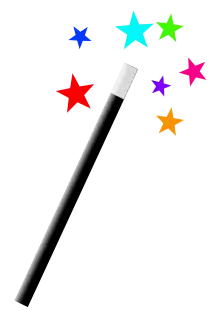wand
See also: Wand
English

A magic wand

A mascara tube with a wand applicator
Etymology
From Middle English wand, wond, from Old Norse vǫndr (“switch, twig”)[1], from Proto-Germanic *wanduz (“rod”), from Proto-Indo-European *wendʰ- (“to turn, twist, wind, braid”). Cognate with Icelandic vendi (“wand”), Danish vånd (“wand, switch”), German Wand (“wall, septum”), Gothic 𐍅𐌰𐌽𐌳𐌿𐍃 (wandus, “rod”).
Pronunciation
- (Received Pronunciation) enPR: wŏnd, IPA(key): /wɒnd/
- (General American) IPA(key): /wɑnd/
Audio (US) (file) - Rhymes: -ɒnd
Noun
wand (plural wands)
- A hand-held narrow rod, usually used for pointing or instructing, or as a traditional emblem of authority.
- 1886 October – 1887 January, H[enry] Rider Haggard, She: A History of Adventure, London: Longmans, Green, and Co., published 1887, →OCLC:
- Then all of a sudden a number of armed men arranged in companies, and marshalled by officers who held ivory wands in their hands, came running swiftly towards us, having, so far as I could make out, emerged from the face of the precipice like ants from their burrows.
-
- (by extension) An instrument shaped like a wand, such as a curling wand.
- A stick or rod used by a magician (a magic wand), conjurer or diviner (divining rod).
- 1859, George Meredith, chapter 13, in The Ordeal of Richard Feverel. A History of Father and Son. […], volume (please specify |volume=I to III), London: Chapman and Hall, →OCLC:
- Love is that blessed wand which wins the waters from the hardness of the heart.
-
- A stick, branch, or stalk, especially of willow.
- c. 1596–1598 (date written), William Shakespeare, “The Merchant of Venice”, in Mr. William Shakespeares Comedies, Histories, & Tragedies […] (First Folio), London: […] Isaac Iaggard, and Ed[ward] Blount, published 1623, →OCLC, [Act I, scene iii]:
- The skillful shepherd peeled me certain wands.
- 1891, Thomas Hardy, Tess of the d'Urbervilles, volume 1, London: James R. Osgood, McIlvaine and Co., page 17:
- In addition to the distinction of a white frock, every woman and girl carried in her right hand a peeled willow-wand, and in her left a bunch of white flowers.
-
- A card of a particular suit of the minor arcana in tarot, the wands.
Synonyms
- staff; rod
- See also Thesaurus:stick
Derived terms
- bubble wand
- golden wand
- love wand
- magic wand
- mill-wand
- optical wand
- princess wand
- royal wand
- search wand
- violet wand
- wand of peace
- wand work
- wandwork
- water wand
Translations
hand-held narrow rod
|
Verb
wand (third-person singular simple present wands, present participle wanding, simple past and past participle wanded)
- (transitive) To scan (e.g. a passenger at an airport) with a metal detector.
References
- Douglas Harper (2001–2023), “wand”, in Online Etymology Dictionary.
Dutch
Etymology
From Middle Dutch want, from Proto-Germanic *wanduz (“wickerwork; barrier, fence”). Cognate with German Wand.
Pronunciation
- IPA(key): /ʋɑnt/
Audio (file) - Hyphenation: wand
- Rhymes: -ɑnt
- Homophone: want
Derived terms
- binnenwand
- buitenwand
- rotswand
- tussenwand
- wandcontactdoos
- wandtapijt
German
Pronunciation
Audio (file) - Rhymes: -ant
Old English
Pronunciation
- IPA(key): /wɑnd/
Etymology 1
From Proto-Germanic *wanduz (“mole”), from Proto-Indo-European *wendʰ- (“to turn, twist, wind, braid”).
Declension
Derived terms
Etymology 2
From windan.
This article is issued from Wiktionary. The text is licensed under Creative Commons - Attribution - Sharealike. Additional terms may apply for the media files.